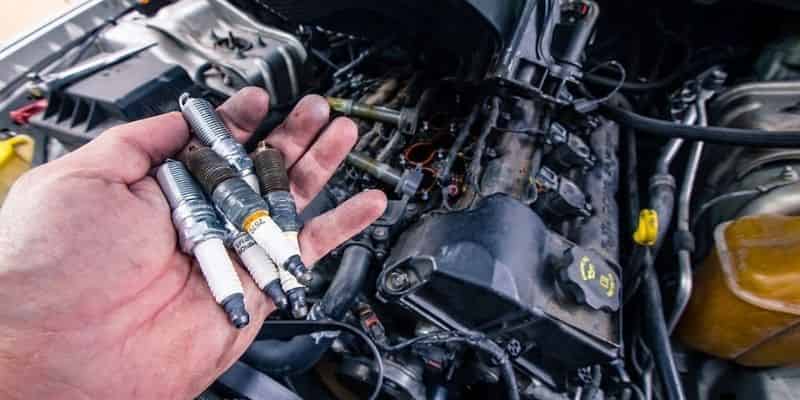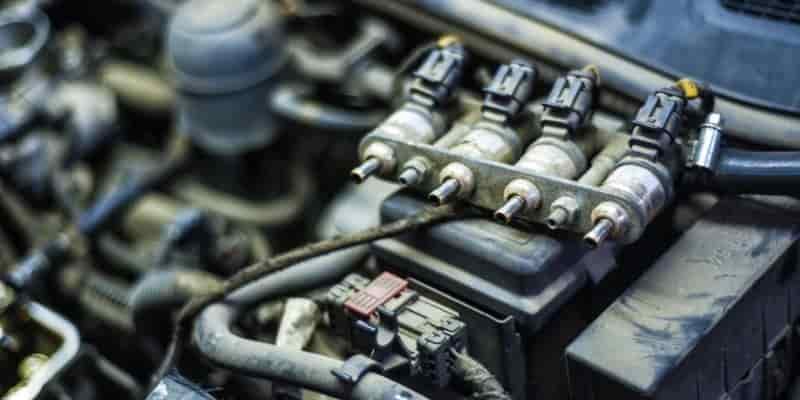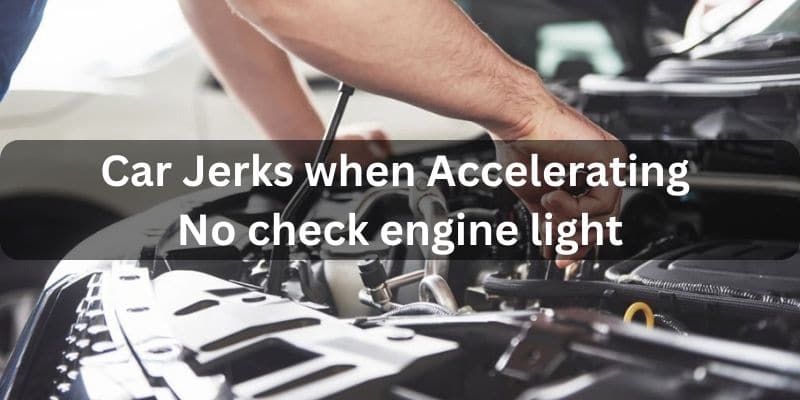Has your car started jerking when you accelerate? This jerking motion when trying to speed up is concerning and annoying. But what makes it even more worrying is that the check engine light isn’t coming on. Without the diagnostic trouble code from the check engine light, what could be causing these acceleration jerks in your car?
There are several possible reasons why your car jerks when accelerating with no check engine light. Identifying the specific cause takes some detective work, but figuring it out and getting your car fixed is important. Driving a jerky car can lower performance and fuel economy and could lead to a breakdown.
In this article, we’ll explore the most common reasons your car jerks when accelerating with no check engine light and how to get your car running smoothly again. Read on to learn what causes acceleration jerking and how to stop it in your car.
Car jerks when accelerating no check engine light: 9 Causes
1. Dirty Fuel Injectors
One of the top reasons your car jerks, when you try to accelerate, is dirty fuel injectors. The fuel injectors deliver fuel from the gas tank into the engine. When the injectors get clogged with fuel residue and contaminants, they can’t provide the proper fuel spray pattern or volume to the cylinders. This can cause the engine to misfire and your car to jerk when accelerating.
If you have dirty fuel injectors, you may notice the car jerking is worse when the engine is cold. The car may even stall out if you try to accelerate. It can also jerk or hesitate when cruising at steady speeds.
To clean clogged fuel injectors, first try a good fuel injector cleaner. These can help dissolve deposits and improve spray. Make sure to use the cleaner regularly to prevent new buildup. If that doesn’t fix acceleration jerking, the injectors may need professional cleaning or replacement.
2. Worn-Out Spark Plugs
Another very common source of acceleration jerking is worn-out spark plugs in the engine. Spark plugs provide the spark to ignite the fuel in each cylinder. But over time, they can wear out and fail to fire properly. This results in occasional misfires as you accelerate, causing the car to stall while idling or driving.
If your spark plugs haven’t been replaced recently, they may have worn electrodes or insulating casings. Cracked spark plug ceramics can also prevent them from sparking correctly. Driving with misfiring spark plugs can eventually lead to catalytic converter damage too.

Replacing worn spark plugs is an essential maintenance item to stop your car from jerking when accelerating. New plugs with undamaged electrodes will provide consistent, reliable sparks. Proper spark timing is key for smooth acceleration.
3. Clogged Air Filter
Your car needs plenty of clean air entering the engine to accelerate smoothly. A restricted, dirty air filter can choke off the engine’s air supply and result in the form of a car hesitating and jerking when accelerating. Without enough oxygen entering the combustion chambers, misfires and hesitations are more likely.
The air filter is responsible for removing particulates and contaminants from the air before it enter the intake and cylinders. But over months and miles of driving, it eventually gets clogged with debris. This causes restriction that limits the engine’s power.
Replacing a dirty, clogged air filter with a new one allows the engine to breathe freely again. It’s easy and inexpensive maintenance. Just be sure to change your air filter at least once a year or every 10,000 to 15,000 miles. This ensures your acceleration won’t suffer from air restriction.
4. Blocked Catalytic Converters
The catalytic converter is part of the vehicle’s exhaust system responsible for reducing emissions. However catalytic converters can become restricted by carbon buildup, preventing proper exhaust flow out of the engine. This back pressure causes performance issues like acceleration jerking.
Catalytic converter blockages are more common in older, high-mileage vehicles. Prolonged engine misfires allow unburnt fuel to reach the converter. This leaves carbon deposits inside the honeycomb structure, restricting exhaust flow. Other symptoms include lack of power, poor fuel economy, and even loud exhaust rumbling.
Removing a severely plugged catalytic converter may be required to stop acceleration jerking in an older vehicle. Your mechanic can diagnose a blocked converter and recommend replacement options. Proper engine maintenance and operation help prevent converter plugging in the first place.
5. Low Fuel Pressure Prevents Proper Acceleration
In order for your engine to accelerate smoothly, it requires consistent fuel pressure delivery to the injectors. A lack of proper fuel pressure will make your car die when driving to speed up. Possible causes include a failing fuel pump, clogged fuel filter, or leaking fuel injector seals.
A worn-out fuel pump may still run, but it can struggle to generate the 40-60 PSI of system pressure needed for clean acceleration. Restricted fuel filters don’t allow enough volume to pass. Leaking injectors lose pressure before the fuel reaches the combustion chamber.
Diagnosing low fuel pressure issues requires testing fuel system components with a gauge. A weak pump or filter will need replacement. Leaking fuel injector seals may simply need tightening or replacement on individual injectors. This restores full pressure for smooth acceleration with no jerking.
6. Low Cylinder Compression
Consistent cylinder compression is required to accelerate your car properly. Low engine compression leads to insufficient combustion and misfires as you press the gas pedal. This results in jerking and hesitation as the engine struggles to gain speed.
Causes of low cylinder compression include worn piston rings, leaking head gaskets, bent valves, or cylinder wall damage. This allows too much air to escape the cylinders during the compression stroke, reducing the combustion power needed for smooth acceleration.
If your car jerks when accelerating due to low compression, a leakdown or compression test can help pinpoint the cylinders with the most loss. From there, inspecting the engine further diagnoses the exact points of compression leaks. Rebuilding or replacing affected cylinders is needed to restore full compression and smooth acceleration.
7. Faulty Airflow Sensors
Modern vehicles rely on airflow or mass airflow sensors to measure the volume of air entering the engine. The computer uses this input to adjust fuel delivery accordingly. If these sensors become contaminated with debris or fail, it leads to inappropriate fueling.
When the engine gets too much or too little fuel due to a faulty sensor, it runs inefficiently. This leads to misfires, hesitation, and jerking as you accelerate. Oxygen sensors may also get faulty readings due to bad airflow data. The check engine light usually comes on in this case.
Cleaning a contaminated mass airflow sensor can sometimes resolve acceleration stumbling issues. But most faulty airflow sensors need replacement. This restores accurate measurement of air volume so the computer can properly meter fuel for smooth acceleration.
8. Damaged Acceleration Cables
Vehicles with manual transmissions rely on sturdy throttle and clutch cables for acceleration. When these cables become damaged, loose, or disconnected, they prevent smooth speed increases. Signs of bad acceleration cables include jerking, hesitation, or inability to accelerate.
The throttle cable connects the gas pedal to the engine throttle for speed control. A worn, loose, or binding thread may not open the throttle smoothly. The clutch cable shifts transmission gears between the pedal and components. Damage here prevents smooth gear changes.

Inspecting and replacing any frayed, loose, or damaged cables is essential for proper acceleration. Adjusting cables so they connect solidly without binding can also fix acceleration jerkiness. Lubricating and maintaining the cables helps prevent future issues.
9. Moisture on Ignition System Components
Components like the distributor cap, rotor, spark plug wires, and ignition coil conduct the high-voltage currents needed for sparking the plugs. If these parts get covered in moisture from rain or car washing, it can interfere with the electrical signals.
When moisture penetrates the ignition system, it provides paths for the spark energy to short-circuit or weaken. This leads to occasional misfires and jerking acceleration as electrical energy is lost. The car may also have issues starting up when components are wet.
Carefully drying any wet ignition components is key to resolving moisture-related misfires. Using protective covers can help keep rain or excessive water out. Make sure to inspect that the rubber spark plug boots are in good condition to seal moisture out of the cylinders as well.
Fixing a Car that Jerks When Accelerating with no Check Engine Light
1. Examine the fuel injectors
Fuel injectors are responsible for delivering fuel to the engine in a precise and controlled manner. If they become clogged or dirty, they may not be able to deliver fuel properly, resulting in a jerking sensation when driving.
Inspecting the fuel injectors and cleaning or replacing them if necessary can help resolve this issue. It is important to note that other factors such as a malfunctioning throttle position sensor or a faulty ignition coil can also cause jerking in the car.
Therefore, it is recommended to have a professional mechanic diagnose the exact cause for an accurate solution. Regular maintenance, such as using high-quality fuel and having the fuel system professionally cleaned, can also prevent fuel injector-related issues and ensure smooth driving.
2. Check the spark plug condition
The spark plugs play a crucial role in delivering the spark needed to ignite the air-fuel mixture in the engine cylinders.
Over time, they can become worn out or covered in carbon deposits, which can lead to misfires and rough running. Checking the condition of the spark plugs is a good starting point when troubleshooting jerking motions in your car.
If they appear dirty or damaged, it may be time to replace them to restore smooth performance.
3. Replace air filter
A dirty or clogged air filter can be a major cause for your car to jerk. The air filter is responsible for filtering out impurities from the air that enters the engine. When the filter becomes dirty or clogged, it can restrict the airflow to the engine and cause a jerking sensation.
In this case, replacing the air filter might solve the issue. This is a relatively simple and inexpensive maintenance task that can improve the performance and efficiency of your vehicle. It is recommended to check and replace the air filter regularly to prevent such problems.
4. Unclog blockage in the Catalytic converter
The catalytic converter is responsible for reducing harmful emissions from the exhaust system. Any blockage in the catalytic converter causes a car to jerk when driving.
Over time, it can get clogged with soot and other debris, restricting the flow of exhaust gases. This can lead to a jerking or hesitation sensation while driving.
To unclog the blockage in the catalytic converter, you may need to take it to a professional technician who can diagnose the issue and potentially clean or replace the converter. Regular maintenance and the use of high-quality fuel can help prevent future blockages in the catalytic converter.
5. Run fuel pressure test
The improper fuel pressure is the most ignored reason behind your car jerking when accelerating at low speed. In this case, it is recommended to run a fuel pressure test to determine if there is a problem with the fuel system. A fuel pressure test will check if the fuel pump is delivering enough fuel to the engine.
If the test shows low fuel pressure, it could be a sign of a failing fuel pump or a clogged fuel filter. Getting this test done can help diagnose the issue and prevent further damage to your car.
6. Replace airflow sensor
The airflow sensor helps the engine regulate the air-to-fuel ratio for efficient combustion.
If it malfunctions, the engine may receive incorrect information and cause the car to jerk. In this case, it is recommended to replace the airflow sensor to resolve the issue and restore smooth driving performance.
7. Find leakage in the acceleration cable
If your car is jerking and there is no check engine light, one possible cause could be a leakage in the acceleration cable. The acceleration cable is responsible for transmitting the driver’s input to the engine, and if there is a leak in this cable, it can cause the car to jerk during acceleration.
The best way to confirm this issue is to have your vehicle inspected by a mechanic who can diagnose and repair the problem accurately.
8. Cylinder compression test
Cylinder compression refers to the pressure that is created inside the cylinders of an engine during the combustion process. If there is a decrease in cylinder compression, it can result in misfires and a rough-running engine, which may manifest as jerking.
To diagnose this issue, a cylinder compression test can be conducted to measure the compression levels in each cylinder and determine if any are low.
Why Is My Car Jerking When I Give It Gas?
If your car is jerking when you give it gas, there can be several possible reasons. One common cause is a problem with the fuel system, like a clogged fuel injector or a dirty fuel filter. Another possibility is a malfunctioning spark plug or ignition coil.
A faulty or dirty mass airflow sensor can also lead to jerking. Additionally, issues with the transmission, such as a low fluid level or a worn-out clutch, can cause jerking when accelerating. It is best to have a professional mechanic diagnose and fix the issue to ensure your car is running smoothly.
Why Does My RPM Go Up And Down While Parked?
There could be several reasons why your RPM goes up and down while parked. One possible cause is a malfunctioning idle control valve, which regulates the engine’s idle speed. If it is not working properly, it can cause fluctuation in RPM.
Another reason could be a vacuum leak, where air is being sucked into the engine from an unintended source, causing the RPM to fluctuate. It is recommended to have a professional mechanic diagnose and resolve the issue to ensure proper engine operation.
Why Is My Car Bucking When I Accelerate?
If your car is bucking or jerking when you accelerate, there could be several reasons behind it. One possibility is a problem with the fuel system, such as a clogged fuel filter or a malfunctioning fuel injector.
Another potential cause could be an issue with the engine, such as a misfire or a problem with the spark plugs.
Additionally, a faulty sensor or a problem with the transmission could also be the culprit. It is best to have a professional mechanic diagnose and fix the issue to ensure the safe and proper functioning of your vehicle.
FAQs
Why is my car jerking but no engine light?
If your car is jerking but there is no engine light on, it could be due to several reasons. Some possible causes include a clogged fuel injector, a dirty air filter, low transmission fluid levels, or a malfunctioning throttle position sensor. It is best to have a professional mechanic inspect and diagnose the issue to ensure the proper repair.
Will your car jerk when the transmission is about to go out?
It is possible for a car to jerk when the transmission is about to go out. This can happen because the transmission is no longer able to effectively shift gears, leading to abrupt and jerky movements. Other signs of a failing transmission may include delayed engagement, slipping gears, and strange noises while driving. If you experience any of these symptoms, it is best to have your car inspected by a professional mechanic.
Is it safe to drive a jerking car?
Driving a jerking car can be quite dangerous. A jerking car may indicate an issue with the engine, transmission, or other mechanical components. It can lead to sudden stops, loss of control, and potentially accidents. It is important to get the car checked and repaired by a professional to ensure safety on the road.
What does car jerking mean?
Car jerking refers to the sudden and unexpected movements of a vehicle while driving. It can occur due to a variety of reasons, such as engine misfires, faulty spark plugs, or transmission problems. This jerking sensation can be uncomfortable for the passengers and may indicate an underlying issue with the car’s mechanics that should be addressed by a professional mechanic.
Can a bad transmission cause jerking?
Yes, a bad transmission can cause jerking in a vehicle. A malfunctioning transmission may result in delayed or erratic gear shifting, leading to a jerking motion while driving.
Additionally, issues with the torque converter or clutch can also contribute to jerking movements. It is important to address these problems promptly to ensure safe and smooth operation of the vehicle.
Conclusion
In conclusion, there are various reasons why a car jerks when accelerating without the check engine light coming on. These include issues with the transmission, fuel delivery system, spark plugs, or even a clogged air filter.
To fix this problem, drivers can try checking and replacing the transmission fluid, cleaning or replacing the spark plugs, inspecting and cleaning the fuel injectors, or replacing the air filter. If the issue persists, it is recommended to consult with a professional mechanic for further diagnosis and repair.

Hi, Michael Williams here. I have always loved everything with an engine. After earning my degree in automotive engineering, I spent 5 years testing vehicles for a major manufacturer in Illinois. Now I am using my technical skills to review the latest models online and help others troubleshoot their engine problems with effective solutions.
